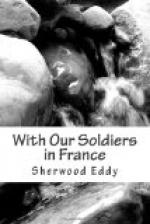5. A lack of moral courage, of independence, and of individual initiative are particular evils of the present. All the men have to act together. They are taught to obey under rigid discipline. Individual initiative is crushed or left undeveloped. The sense of personal responsibility and of personal ownership is often weakened. This lack of the sense of private property may partly account for the pilfering which goes on. The men find it exceedingly difficult to take an open stand on moral or religious questions before their comrades. A soldier will ordinarily hide his religion and is afraid to be seen praying or doing anything that makes him peculiar, although the most immoral and obscene man is not ashamed of his actions.
A lieutenant of the Royal Irish Rifles says: “Taken singly they are afraid to face public opposition, anxious to avoid bother and exertion, slack, and easily overcome by temptations. There is a fairly general chaotic unrest, but little or no serious thought. There is a greater tolerance towards vice. Many more men practice sexual vice than before and most refuse to condemn it. It might be said that the men are more open to religion, but less religious. They are also more open on the question of sacrifice, the need for living or dying for others.”
An army chaplain who himself served in the ranks writes of the soldier: “He lives an animal life in which the thinking is done for him. Indeed his relative comfort depends upon the extent to which he can abstain from thinking. In France the number who take drink increases greatly. It is wicked, damnably wicked that our lads through ignorance should be allowed to slip into sins which in themselves are deadly, but which also open the door to deadlier sins. . . . There are many indications that when the Army returns there will be a great social upheaval. Men feel that they are out to fight Prussianism, but they are becoming growingly conscious of Prussianism in our own national life. They are very conscious of it in military life.”
If we were to sum up our impressions we would be compelled to say that there has been an increase of immorality, drinking, and bad language during the period of the war.
II
Let us now ask, What is the attitude of the men to religion, and what are the characteristics of their religious life in war time? The war seems to have intensified all the tendencies of peace time. It makes a man a greater sinner or a greater saint. He is either driven to God or away from Him. It would be impossible for any single human mind adequately to sum up the good and evil of war, and strike a balance between the two. Most Christians cannot believe that war is in itself good. To those who have seen its hideous reality it is unquestionably a dire evil. Even the best results of war might have been better attained by other means. The good is often revealed rather than caused by it. A moral equivalent for war might have been found. Certainly no Christian could defend war save as a last resort, forced upon a nation in defense of its life or for the lives of others, when all more rational or judicial methods had failed.




